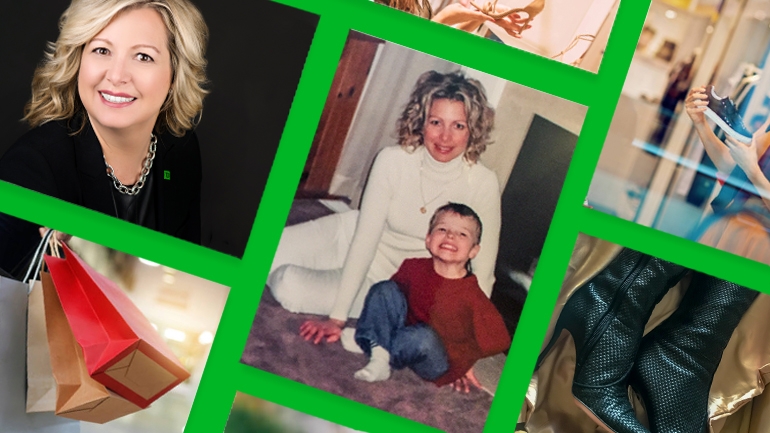In the second installment of our advice series, one TD leader shares how one pair of luxurious, yet uncomfortable boots taught her just how emotional our relationship with money can be.
By Rina DeGrazia
Vice President, Financial Education
It was one of those days where everything that could go wrong, did.
It was about 10 years ago, and I was working at TD Wealth. Most days, I loved my job, my team, coming into the office, and the work I was doing.
This, however, was not one of those days. This also happened to be the day I learned just how emotional our relationship with money can be.
Looking back, I don’t remember the details, just the overwhelming feeling of the pressure mounting. I was reaching a tipping point—the moment when the straw that breaks the camel’s back would materialize.
Then the phone rang again.
So, I did what any rational person would do – I decided to remove myself and get some air. I grabbed my purse, sent calls to voicemail and left for lunch. A neat little row of taxi cabs greeted me just outside the building, waiting to transport me to my place of solace – which in my mind was anywhere but where I was.
My cab driver asked: where to? And before I knew it I replied, Bay and Bloor. For anyone unfamiliar, this is home to Toronto's most stylish – and expensive – shopping strip.
Now, it’s worth noting that I am the kind of person who has always been very responsible with money. I grew up in a family with four children, so I knew the importance of stretching a dollar. I worked to help pay my way through university and managed to fund my education in real time and avoid a student loan. When my husband and I were married, I acted as household CFO to ensure we were accelerating our mortgage payments while still saving for retirement.
But like I said, money is emotional.
As the cab approached my destination that day I asked myself where I was going and what I was doing. When the cab pulled over, I asked him to wait to leave the meter running.
I had never in my life been shopping at Bay and Bloor and had no idea what I was looking for. But like so many women, I have always had a passion for shoes (you gain 10 pounds, you lose 10 pounds, outfits come and go, but your shoes always fit.)
I walked into the first shoe store I saw and my eyes were immediately drawn to a magnificent pair of black four-inch heel boots. They sat alone on a table, displayed like a piece of art.
The next thing I knew I was swiping my credit card.
Distracted by my new purchase, my anxiety disappeared and the 10 minute cab ride back to the office was almost serene.
It was not until I returned, triumphant with the package in hand that one of my colleagues inquired what was in the bag. As I carefully unpacked and displayed them, she asked the question: how much did those cost?
It was in that moment that I realized, I didn’t know.
And then the emotion, the impulse and now a new anxiety of splurging all caught up with me. I had signed the credit card slip without checking the price. Worse yet, I hadn’t even asked.
Imagine my face, in front of my colleague, when I saw the receipt, I had just dropped over a thousand dollars.
The store didn’t have a refund policy, so 10 years later, these boots remain the most expensive pair of shoes I have ever owned. They also remain the most uncomfortable pair I have ever owned. They hurt my feet just as much as they hurt my wallet and I can count the number of times I have worn them on one hand.
But I’ve held on to these boots and keep them in a closet – just visible enough to serve as a valuable lesson for me and a reminder of how emotional money can be.
Those boots are also a physical manifestation of how important budgeting is. Everyone budgets differently, but I find that separating money into different accounts is helpful – one for bills and rent, another for savings, and a third for what my grandmother called "mad money."
At the same time, I also learned that when you are shopping on impulse, it's always best to pay in cash. Handing over cold, hard cash always seems to register mentally on a different level over tapping a credit or debit card. Behavioral economics calls this 'the pain of payment principle' and it can help discourage frivolous purchases.
These days, when I find myself on the verge of making an impulse purchase, I always ask the store to hold the item for 24 hours. If I can go home and think rationally about the purchase, I often decide it's not something I need.
For so many of us, these kind of purchases come down to understanding that there's a difference between being able to pay for something and actually being able to afford it.
